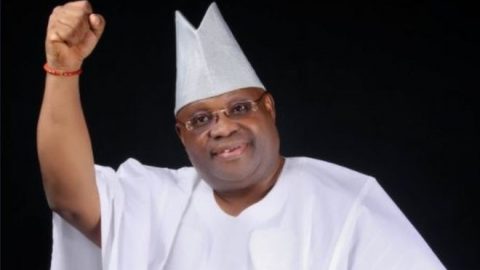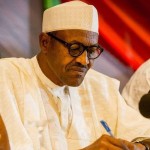OPINION: Osun Governorship: Battle Between Constitutional Breaches and Technical Frivolities
Articles/Opinion, Featured, Featured Contributors/Columnists, Latest Headlines Tuesday, June 25th, 2019
By Adebisi Adebiyi
(AFRICAN EXAMINER) – The just concluded hearing of Osun governorship appeal is an eye opener to how a section of the bar is consistently fixated on dragging the bar and bench in the mud through amplified frivolous technicalities. In fact, the challenge of justice delivery is further worsened by some senior lawyers who reached stardom through “justice- denying” legal shortcuts. The Ongoing Osun case is a classical example.
Osun case has come a long way. A lot has happened, and Nigerians follow keenly the issues. From the Election Petition Tribunal to the Supreme Court, Nigerians expect passionate legal discourse and a dispassionate judgement by the lord justices. The Chief Justice of the Federation, Tanko Muhammed had in realisation of these yearnings of Nigerians directed judges handling election petitions to focus on issues and avoid technical shortcut. At the hearing that day, the CJN reaffirmed this principle when he declared as follows: “Your briefs, we will read twice, thrice and even more before we put our pen to write judgement. We will do justice”
Four judgements are now before the Supreme Court namely the majority and the minority judgements at the election tribunal and the majority and minority judgements at the court of Appeal. While the majority ruling at the tribunal returned Senator Ademola Adeleke as the winner, the minority judgement differed. At the Appeal court, the majority judgement nullified the tribunal majority ruling while the minority ruling upheld the tribunal ruling.
It may suffice to review the judgements of the tribunal and that of appeal court. The tribunal had ruled that the rerun of September 27 was illegal as it was based on an illegal cancellation of seven polling units from September 22 election. The cancellation was presumably done to deny victory to Senator Adeleke who has won at first ballot from the September 22. The majority judgement also reviewed and readjusted the September 22 results on the basis of proven mutilation and manipulation of results sheets. The tribunal subsequently declared Ademola Adeleke as the winner.
The appeal filed by Gboyega Oyetola was however predicated mostly on fillipant considerations advanced by the appellant. Rather than dwelling on core issues as determined in the tribunal ruling, the majority judgement of the appeal court anchored its decision on the absence from court for one day of a judge who delivered the tribunal majority ruling. The false narrative and submission was that the tesimonies of those who witnessed on the day the judge was absent formed the crux of the majority judgement. The false submission then concluded that since the judge was not present, he could not have correctly applied the testimonies to make judicial inferences.
In reality however, the above was not the correct narration of event at the lower court. The testimonies on the said date had nothing to do with voting results. It was about alleged boastful campaign speeches of Senator Adeleke. The majority judgement could not therefore have relied on the said testimonies as they have nothing to do with manipulation of results sheets ,the grounds deployed for the review and eventual declaration of Adeleke as the winner of the election.
When the issue was raised at the hearing, the respondent had requested the appeal court to summon records from the tribunal to determine what actual event of the said date….was the judge actually absent? What does the court records of the day said? Any need to clarify from the said judge?
Interestingly, the appeal court refused to summon lower court records to confirm the veracity of appellant’s submission. A check on court proceedings would have answered the above questions as it would allow for clarifications not just on the court records but on the judge himself. Such verification would have also showed that the testimonies on the said date was not on results manipulations which formed the crux of the majority judgement at the Tribunal. Yet, the majority judgement at the Appeal Court embraced and relied on that weak light point to upturn the tribunal majority judgement.
The minority judgement however sets the records straight and redeemed the integrity of the Appeal Court. In his dissenting judgment, Mr Mbaba disagreed that Justice Obiora did not attend the proceedings of February 2. He said the allegation that Justice Obiora did not sit is a well-articulated speculation.
The minority judgement proceeded to reject an unverified allegation of judge’s absence as a ground to upturn a tribunal ruling. The judge who was accused of absence in court was not giving fair hearing. He was neither called to clarify the situation nor was the registrar of the Tribunal invited to submit court records. The whole decision was therefore predicated on hearsay, leading to clear miscarriage of justice.
The dissenting judgement noted that aside non-verification of the allegation of judge’s absence, even the testimonies on the said date were rather comedic without any serious substance. The day was full of comedy as the two witnesses brought by the respondents were busy entertaining the court. If court records had been summoned, the Appeal Court would have seen the inconsequential nature of happening on the said date. The court would not have relied on a well articulated speculation to arrive at a decision.
Also germane to the whole issue is that there was no connection between the majority judgement and the comedic show of the said date. The tribunal majority judgement had articulated series of breaches backed up with proper review of testimonies and legal authorities. As the jokes and laughing matters that dominated proceeding on the said date had nothing to add or remove from the substance of the case, the majority judgement suffers no defect by not reflecting the jokes.
The tragedy of it all was that a lie was woven around the jokes as the basis for the tribunal majority judgement. How can jokes on campaign podium be linked with cold votes’ calculation effected by the majority ruling? This clear error was pointed out by the minority judgement which again clarified that the question of judges’ absence was unverified and was mere speculation. The reality is that witness’ testimonies on the said date have no impact on majority judgement as it has no substance.
The minority judgement further affirmed that the rerun was illegal as the cancellation of votes was done by the wrong person and at wrong level. If the cancellation was illegal, the entire rerun election was adjudged unconstitutional and of no effect. This position of the tribunal was upheld by the minority dissenting opinion.
As a follow up, the dissenting opinion upheld the election of September 22 as a basis for determining the winner of the election. It confirmed deliberate manipulation of election results to favour Gboyega Oyetola through deliberate doctoring of election results sheets after pink copies had been issued to party agents. Justice Mbamba declared that the alterations and manipulation were substantive enough to affect the outcome of the election.
The subsequent declaration of Senator Adeleke as the winner was done after removing the false votes from the genuine votes based on pink copies issued to party agents after the September 22 election. To effect this, the tribunal relied on a subsisting court judgement which had struck down limit on judicial powers to declare winners of election after judicial review of election results.
Beyond the above, there is also the critical constitutional question which both the tribunal and the appeal court failed to address. The constitution spelt out two conditions for getting declared as a winner of a governorship election namely majority of votes cast and one quarter of votes in two third of the local government within the state. The question is whether any body or agency has power to add or remove from such constitutional stipulations. When petitioner requested that Adeleke be declared winner on the basis of that constitutional provision having satisfied the requirement, the tribunal affirmed that it cannot address the issue because it is specialised body.
The Appeal Court also failed to rectify the issue. The minority judgement on the other hand added this as a major ground for declaring Adeleke as the winner. Justice can only be served when the superiority of the constitutional is accepted by all stakeholders.
Above any other considerations ,the review is best concluded with the words of the Chief Justice of the Federation, Tanko Muhammed : “We take our time in taking notes and writing judgments to avoid making mistakes. We subject every case before us to intense debates and arguments during our conferences in order to be as dispassionate and objective as possible. Let me state clearly that we are not answerable to anybody and can never be intimidated by anybody whatsoever in taking our decisions.
But for certain, we are only answerable to God Almighty because he is the owner of our lives. No human being, living or dead can influence the reasoning or judgments of the Supreme Court of Nigeria. We are very independent in Supreme Court because of the enormity of the trust and responsibility reposed in us by the almighty God, the Constitution and our dear nation,” Muhammad said
*Adebiyi Adebisi, a public affairs analyst sent this piece from Ikoyi, Lagos
Related Posts
Short URL: https://www.africanexaminer.com/?p=48770






















